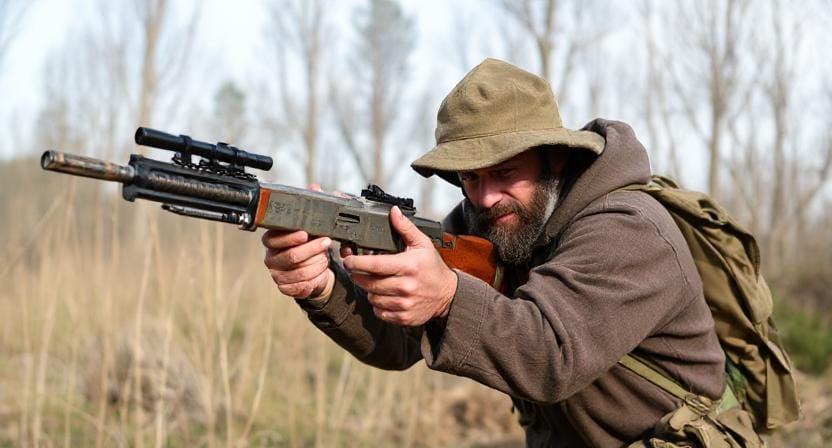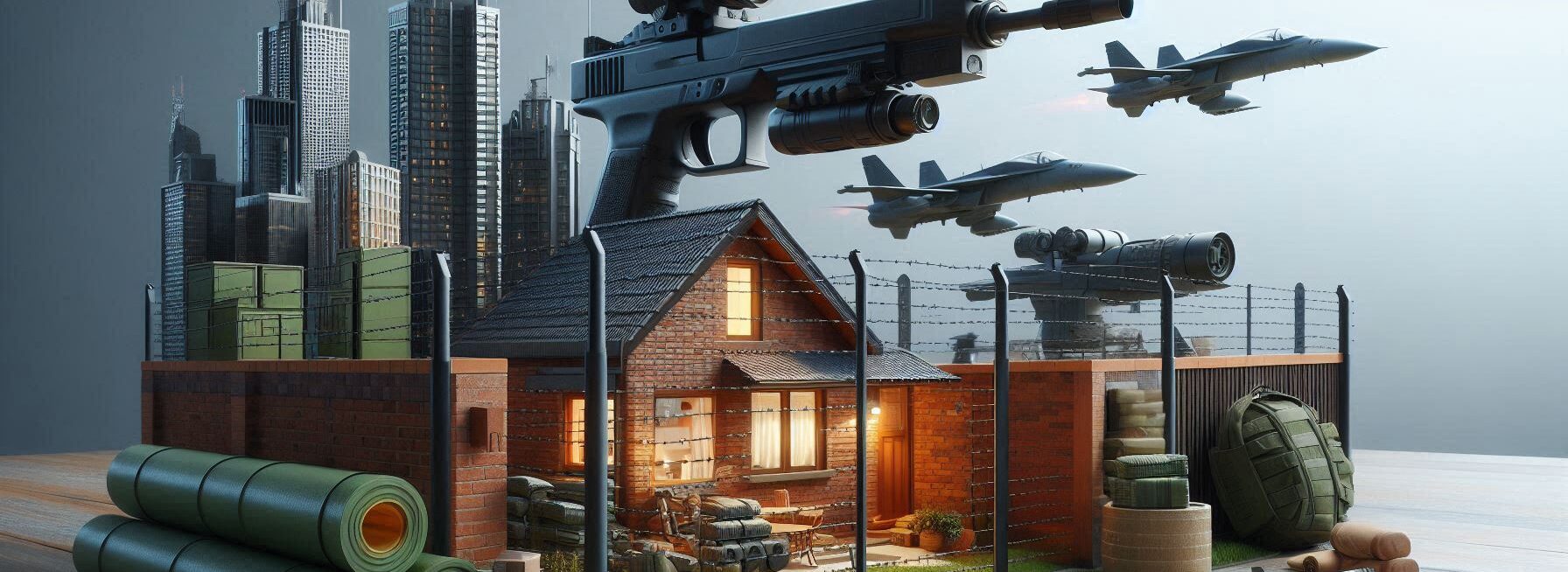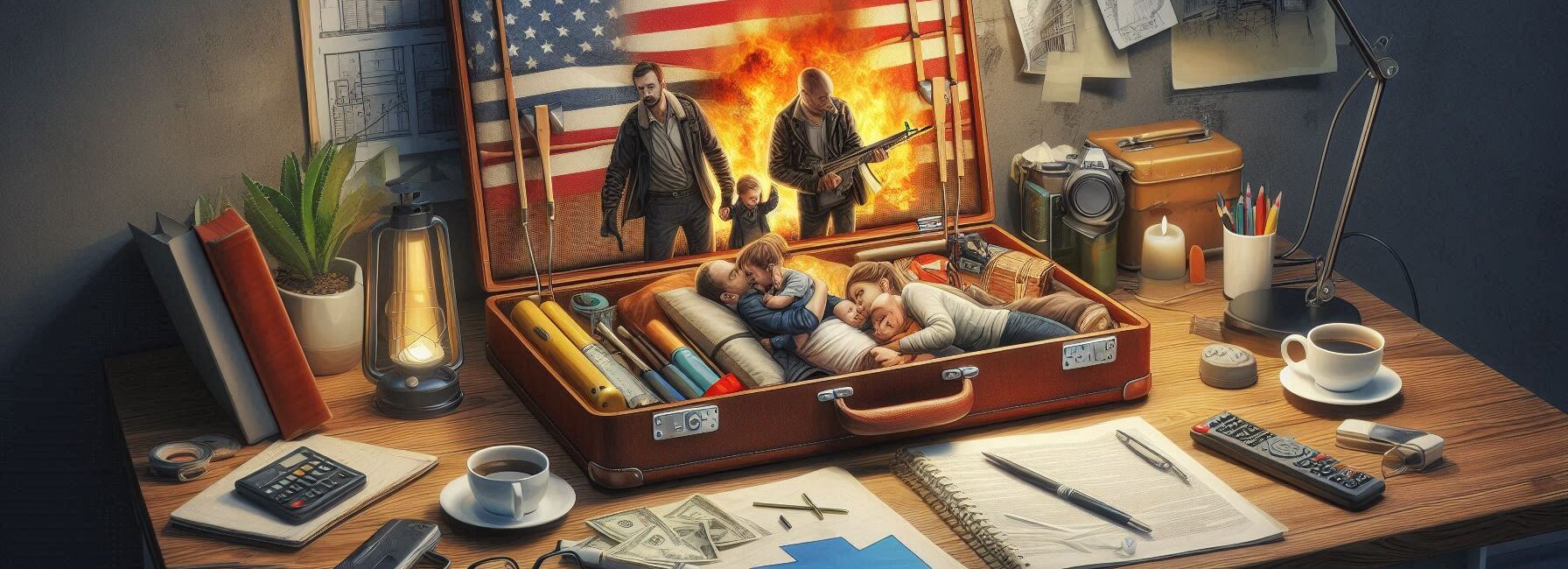Please Note: This post may contain affiliate links. If you click one of them, we may receive a commission at no extra cost to you. As an Amazon Associate, I earn from qualifying purchases.
Last Updated on November 1, 2025 by Kevin Collier

Top Takeaways and Key Concepts
- Prioritize escape and distance: move to safe, populated areas immediately.
- Use everyday objects defensively as shields or to create distraction.
- Stay calm; take deep breaths to think clearly and act.
- Know local self‑defense laws to ensure legal, proportionate responses.
- Practice de‑escalation techniques and regular safety drills with family.
Life can be a little wild, right? One minute you're soaking up the sun in the park, feeling all chill. The next moment? You're thinking about how to protect yourself. You’ve got a half-eaten sandwich in one hand and your shoelace in the other. Crazy, isn't it?
Don’t worry! You can turn everyday stuff into makeshift weapons. Who knew a sandwich or a shoelace could help? It’s kind of funny when you think about it. Imagine trying to explain that to someone. “Oh, I defended myself with a sandwich!” 😂
Let’s get creative. A broomstick? Perfect. It’s long and sturdy. You can wave it around like a wand! Or a backpack filled with snacks can become a shield. Imagine swinging it to keep someone at bay.
Things like keys can even work! Simply hold them in your hands. You can do a lot with what's around you. We don't always need expensive instruments to be safe. Sometimes, we just need to think, don't we?
Knowing that you have choices will make you feel so much more powerful. It's like being in a secret club of people who want to survive and make the most of what we have.
So, the next time you're out and about, have a glance about. Think about what you can do. It can be fun! Take that sense of humor and turn it into an experience. You never know what you might find in your backpack or pocket. You never know what life will throw at you!
What Is an Improvised Weapon?

What is an improvised weapon, to begin with? Basically, it's anything that wasn't made for fighting but can be used well when you need to or when someone attempts to take your favorite snack.
*** Shop for Survival Gear - Tools - Kits ***
Survival Gear - Bags and Backpacks - Knives - Boots/Footwear - Communication
Outdoor Cooking - Gloves - Hydration - Dry Boxes - Water Filtration Systems
Tents - Sleeping Bags - First Aid Kits - Multi-Tools - Flashlights - Fire Starters
Navigation - Survival Food - Night Vision - Headlamps - Stun Guns - Binoculars
Take a look around your kitchen. There are a lot of things that could help you if you need them.
A pen (yep, those little writing sticks), a robust umbrella, or even a roll of duct tape can all be improvised weapons. If you can use them in a creative way, they count!
The best thing about these things is that they're easy to find; they're usually right in front of us. Instead of freaking out when anything goes wrong, realize that aid can be right there in your kitchen or in your backpack!
Things You Use Every Day That Can Hurt

Let's look at some typical household things that could be useful for self-defense:
1. Pens: Believe it or not, those seemingly harmless writing tools can become really dangerous weapons when you're close to someone. If you hold a pen tightly, you can stab at weak spots like the eyes or throat. This is much better than begging someone nicely to back off!
2. Kitchen Tools: Forks and knives aren't simply for dining; they may also be great weapons. Imagine yourself swinging a spatula like a sword and yelling, “Get back!” It might not be standard martial arts training, but it will definitely make for a great story afterward!
3. Bags: Whether it's your purse or grocery bag full of strange things (like receipts from three weeks ago), swinging one of these bad boys could put enough space between you and an attacker without you even breaking a sweat.
4. Umbrellas: They not only keep us dry in the rain, but they can also deliver powerful blows if used appropriately! Also, they look so harmless that no one would guess you're ready to act.
How to Use Improvised Weapons

Using improvised weaponry isn't as easy as just picking up something around and hoping for the best; it takes skill! Here are some ways to make the most of your effectiveness:
1. Stay calm. It's not easy when adrenaline kicks in! But don't forget that panic makes you make bad choices, like trying to use bubble wrap as armor. Before dealing with any threat, take a few deep breaths.
2. Aim for Weak Spots: Focus on hitting sensitive places like the eyes, nose, throat, or crotch. These spots tend to swiftly disable assailants without needing expert-level skills.
3. Keep Your Distance When You Can: If you have to fight someone bigger or stronger than you (which sounds scary!), keep your distance by using longer things like brooms or poles to your advantage.
4. Practice Makes Perfect: Think about practicing using different things defensively, even if it's simply pretending to do it at family game night! Knowing something well gives you confidence, and trust me, confidence goes a long way beyond just having strong muscles.
Things to Think About Legally When Using Improvised Weapons

Now let's talk about something really important: the law! I think it's important to be creative while defending yourself (remember my earlier spatula reference?), but it's also important to know the regulations in your area concerning using weapons.
In a lot of places, employing a makeshift weapon might be legal under self-defense laws, but there are some exceptions! For example, was there intent? Did you make things worse instead of better? All things considered, knowing what is acceptable force will help you stay safe and out of trouble with the law after a fight.
So, before you turn your favorite frying pan into a weapon against bad guys, do some research on the laws that apply to you so that you don't get caught off guard by the police when you run into an intruder!
Getting Your Mind Ready
Part of being ready isn't just being physically ready; it's also being mentally ready, which is interesting. Imagining different situations in which you might need to invent weapons can help you become more resilient to fear-induced paralysis in real life.
Along with improving your practical abilities, think about practicing mindfulness. Staying grounded helps you make quick decisions when you're in danger, which is a must-have attribute whether you're dealing with aggressive raccoons at campgrounds or uninvited guests at home!
Conclusion: Embrace Your Inner MacGyver
At the end of the day, things can get a little crazy, right? You never know when you might need to think on your feet. Improvisation can be a game-changer. It shows you a whole new side of yourself.
Imagine this: you’re in your living room, and there’s a strange noise outside. Instead of panicking, remember all those little things around you. A pillow? A spatula? These can become your makeshift tools. Pretty wild, huh?
When we think beyond the box, we find new ways to do things. You begin to feel more sure of yourself. That feeling of being able to find things? It helps with everyday things, too. Do you need to fix something? Take that tape. Looking for the remote? Be creative!
Take a glance around your house the next time you feel like doing something crazy or maybe a little paranoid. Look under the couch or near the fridge. There might be something just waiting for you to make it into your superhero attire. A hanger for coats? A broom? Believe me, they can do amazing things.
There are always surprises in life. You can't always know what you'll need or when. So accept the unexpected. You can make any regular day an adventure if you use your imagination. Just think about all the things that could happen! Keep that spirit going. You can do this!
Frequently Asked Questions
What is an improvised weapon?
An improvised weapon is any everyday object used defensively when no dedicated weapon is available.
Which household items can be used for protection?
Common examples include pens, umbrellas, bags, broom handles, and kitchen tools when used to block, push, or strike.
Should escape be the primary goal?
Yes. Creating distance and reaching a populated safe area should always be the first priority when possible.
Where should improvised strikes be directed?
Target vulnerable areas such as eyes, nose, throat, or groin to quickly disable and gain a chance to escape.
Is staying calm important during self-defense?
Yes. Clear thinking improves reaction time, decision-making, and helps prevent impulsive, unsafe actions.
Are there legal risks in using improvised weapons?
Self-defense laws vary by region; force must be proportional and legally justified to avoid criminal liability.
Should people practice with improvised objects ahead of time?
Practice improves coordination, confidence, and efficiency, especially when done safely and intentionally.
Suggested Resources:
Improvised Weapons: A Self-Defense Guide
https://www.selfdefenseguide.com/improvised-weapons
How To Use Household Items as Self-Defense Tools
https://www.survivalskills.com/household-self-defense
Everyday Items You Can Use for Self-Defense
https://www.defensivewomen.com/everyday-items-for-self-defense

Kevin Collier is a seasoned survivalist and expert in prepping and homesteading, contributing to WiseSurvive.com. With a deep-rooted passion for self-sufficiency and outdoor survival skills, Kevin shares practical advice, strategies, and resources to help individuals prepare for any challenge. His informative articles cover a range of topics, from essential survival techniques to sustainable living practices, empowering readers to thrive in any situation. Whether you're a novice or a seasoned prepper, Kevin's insights will inspire you to take charge of your readiness and build resilience for the future.




